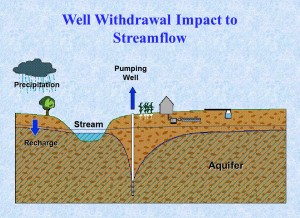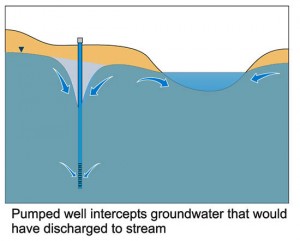Our January newsletter reported the adoption of new state water use regulations that are designed to require communities to try harder to minimize impacts on stream flows. The new requirements apply to all public wells in the state, and all communities will be applying to renew their permits, but our South Coastal communities are the first to receive “Orders to Complete” from the state Department of Environmental Protection. We will be the first to explain how they will further protect stream flows.
There is much work to be done. The state classifies streams into 5 levels of stress, depending on the impact of groundwater withdrawals on stream flows in August. Many of our North and South River tributaries with town wells in their basins are in the 5th, the highest, level of stress!
 Our Association is very proud of the work we have been a part of to remedy structural impediments to the streams, including removing dams, clearing culverts, and constructing fish ladders for the water supply dams in Scituate, but these structural solutions only remedy half the problem: allowing free flows in our streams will only benefit fish passage if there is enough water in the stream in the first place!
Our Association is very proud of the work we have been a part of to remedy structural impediments to the streams, including removing dams, clearing culverts, and constructing fish ladders for the water supply dams in Scituate, but these structural solutions only remedy half the problem: allowing free flows in our streams will only benefit fish passage if there is enough water in the stream in the first place!
New Stream Flow Improvement Requirements
So we are taking the implementation of these new regulations, and the requirements for towns to protect stream flows from their withdrawals, very seriously.
Unfortunately, given the stressed nature of our streams, these requirements are less to actually “do” things, than to consider a range of options. None of these options are unusual, but it is important that for the first time towns are explicitly required to explain their actions, or inactions, with regard to:
- Monitoring stream flows
- Public education and outreach on water conservation techniques
- Water audits and leak detection to ensure water is being used efficiently
- Ensuring proper metering of water
- Reviewing the cost of water to ensure pricing signals reduce nonessential water use (i.e. outdoor use of water)
- Municipal building conservation to set a good example for the community
- Industrial conservation to ensure the businesses are using water efficiently

In addition, and very significantly, because all our streams are at the maximum stressed level, communities will be required to implement non-essential outdoor water use restrictions when specific triggers occur. The trigger might be calendar based, throughout the May 1 – September 30 irrigation season, or flow based at specific stream gages. This “proactive” requirement contrasts with past experience when many towns would “react” and adopt watering restrictions when forced by drought conditions.
NSRWA’s strategy
Left to themselves, many towns might be unable or unwilling to adopt measures necessary to protect and restore stream flows. They may not have the technical capability or the political will to make hard choices.
Our Association has long experience working with towns to shape solutions to stream issues. These have included pollution problems in Marshfield, dam removal in Norwell and Hanover, and especially our long partnership with Scituate to manage flows and alter dams and fish ladders to both to assure water supply reliability and to improve fish passage.
We have completed an initial contract with the towns of Norwell and Hanover to model the impacts of potential water management strategies on Third Herring Brook. We hope this will lead to an on-going partnership with those towns to implement solutions that, as happened in Scituate, will assure water supplies for our neighbors while improving stream flows in the brook.
Image Credits: Horsley Witten Group

